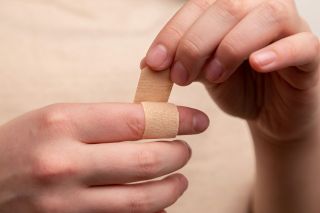Emotions
How to Recover From Small Mood Injuries
Do this when emotional wounds that seem trivial are not.
Posted March 26, 2024 Reviewed by Ray Parker
Key points
- Small mood injuries are minor events that can negatively impact our mood, leaving us feeling down.
- Minor mood injuries can have a significant impact, especially when they happen close together.
- Accurately labeling your emotions, even negative ones, is essential in dealing with them.

Have you ever heard the phrase
"death by a thousand paper cuts?" Though death is too dramatic in this context, small mood injuries can have a disproportionate impact on how we feel. Here, we will delve into how to recognize small mood injuries and how to recover when they occur.
What Is a Small Mood Injury?
A small mood injury is a minor event that shifts your mood. These events can leave you feeling flat, tearful, demoralized, anxious, or like hiding away.
Here are examples of common triggers to illustrate how diverse and ordinary these can be:
- A benign comment or observation that triggers social comparison, like seeing a child who has mastered a skill your child hasn't yet.
- A small mistake that makes you feel like you're not doing a good job of adulting.
- A small setback when you're applying high effort, like an item unexpectedly breaking when you are trying to improve your finances.
- A small frustration when you're attempting to be highly efficient, like driving to an ATM to get an errand out of the way and finding it out of service.
- Someone joking about a topic that is important to you.
- When someone else who is usually friendly and upbeat isn't, causing you to miss out on the expected boost you get from interacting with them.
- You're going to an event for an hour, checking your email when it ends, and seeing new to-do items rolling in.
When Do Small Mood Injuries Impact the Most?
Small mood injuries tend to rattle us the most when:
- several occur in a short space of time (like three occurring in an hour),
- when you're already feeling vulnerable or don't have a lot in reserve due to factors like fatigue or sickness,
- when you've put a big effort into pulling your mood together, only to have it deflated by a small event.
How to Recover From Small Mood Injuries: A Short Guide.
Recognize the triggering event.
Simply connect the event with why you feel suddenly deflated.
Label your emotion precisely.
Earlier, I mentioned several different sample emotions that a small mood injury could trigger. Common ones include flat, lethargic, demoralized, tearful, deflated, frustrated, dispirited, discouraged, disappointed, and defeated. Label how you feel as precisely as possible without amplifying the emotion. Let yourself feel the emotion.
For example, if you feel demoralized, say the word "demoralized" aloud a few times. This allows the emotion to settle on you rather than pushing it away.
Validate your emotions without amplifying them in an overly dramatic way. For example, "I feel like hiding" is better than "I feel like going into a cave and never coming out."
Several specific emotion words sometimes tell us a lot about small injuries, even within the word. For instance, you might feel discouraged when you have summoned your courage only to have it dashed by a trivial event. Or, you might feel dispirited when you have mustered enthusiasm or vigor only to have it squashed.
You can add an action impulse, like feeling like hiding, but try to also identify the emotion underlying that.
Curb rumination.
Rumination is like adding gas to a moody fire. Rumination often contains "should" thoughts like:
- "I shouldn't be so sensitive," or
- "Other people should be more thoughtful before speaking," or
- "I should be doing a better job of managing my life," or
- "Things should go smoothly for me when I'm trying hard."
Notice these thoughts if you're having them, and let them pass. You can use imagery for this. A popular version is imagining your ruminative thoughts, each sitting on a leaf that is floating away down a stream.
Allow time to pass.
If you don't ruminate, your mood will often repair itself from a small injury, just like your body will repair itself from a small cut or bug bite.
Strike a balance between allowing yourself to be a little wounded and getting on with whatever is valuable to you in your life. That could be as simple as kissing your child, hugging your cat, washing your dishes, or watering your plants. It doesn't need to be, and probably shouldn't aim to be, hyper-productive.
Mood injuries don't need to be major events to trigger rumination and distress. When small mood injuries occur, you can use a plan like the one outlined here to cope and feel better.




